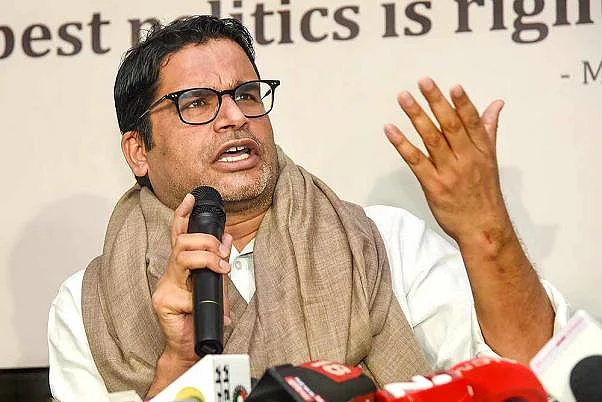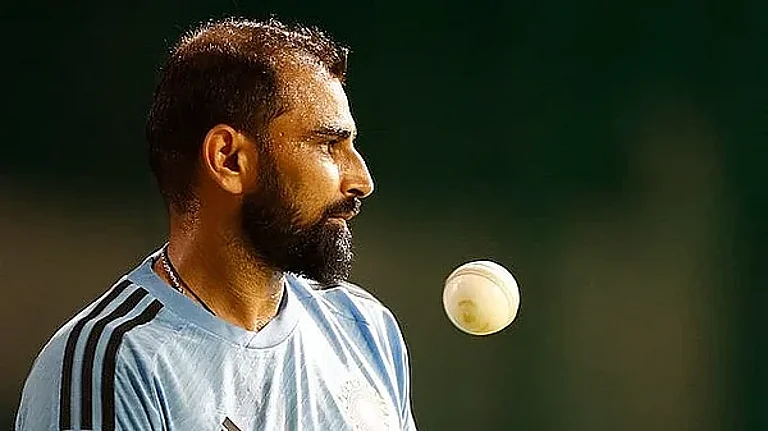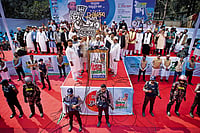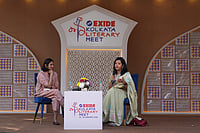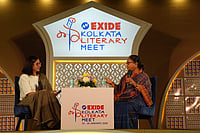Entrusted with helping the Trinamool Congress (TMC) regain public support by reducing corruption and factionalism among grassroots and district-level leaders of the party, poll strategist Prashant Kishor’s organisation, Indian Political Action Committee (I-PAC), has now started feeling the heat of infighting and factionalism present in the party.
On October 3, veteran TMC leader and MLA from Cooch Behar South, assembly constituency-- Mihir Goswami announced that he was taking a break from politics, expressing his disgruntlement over the appointment of the new TMC committee at the district and block levels. He said he was even ready to resign from the Assembly if the party chief, Mamata Banerjee, wanted him to do so. On October 5, anonymous posters emerged near Berhampore town in Murshidabad district accusing Kishor’s organisation of extortion. The posters were issued in the name of “the original TMC workers.”
While Goswami’s mobile phone has remained switched off since then, his close associates have revealed on condition of anonymity that Goswami was upset with the way I-PAC influenced the state leadership with regards to reorganisation of the party.
“The state leadership later reached out to Goswami to enquire about his grievances. He complained that I-PAC had submitted before the state leadership a biased report, prepared on their basis of its team’s proximity with a section of the district unit leaders,” one of Goswami’s close associates revealed.
The TMC’s Murshidabad district unit president and Murshidabad MP Abu Taher Khan rubbished the charges of extortion against I-PAC and said the posters were the handiwork of opposition party leaders. The party’s Cooch Behar district unit president Partha Pratim Roy tried to downplay Goswami’s decision and described him as a “guardian”.
However, political observers have not failed to notice a growing trend of resentment among a section of TMC leaders over Kishor’s increasing influence in the party. The widely-speculated rift between the party and its popular youth leader, transport minister Suvendu Adhikary, has been quite frequently attributed to the minister’s perceived dislike of I-PAC’s interventions in organisational affairs. The speculations were triggered by Adhikary’s absence in a number of meetings attended by Kishor and events organised by I-PAC in Adhikary’s home district, East Midnapore.
His father, veteran TMC MP Sisir Adhikary has ruled out any change in Suvendu’s loyalty. But Adhikary junior has not been seen in any of I-PAC’s state-wide programmes like as “Didike Bolo” in 2019 and “Banglar Gorbo Mamata” conducted this year.
“Leaders with a bad public image are finding their wings being clipped. We are also trying to bring democracy at all levels of the party. Some reactions are expected,” said a senior leader who is a part of the party’s 21-member state coordination committee. The leader has wished to remain anonymous.
Since its appointment in June 2019, I-PAC has become an integral part of the TMC. The organisation was roped in about a month after the party faced a massive blow from the BJP in the Lok Sabha elections. At present, its members are working with every MLA and district unit of the party, handling the social media presence of a number of TMC MLAs and MPs, and managing the TMC’s IT cell at every district and block level.
In every district, a set of senior TMC leaders, including MLAs coordinate with I-PAC employees, widely known in Bengal’s political circles as “Team PK”. These I-PAC employees have been travelling to every nook and corner of the state for the past few months to assess the ground reality, public image of the local leaders of different parties, including the TMC, and the needs of the local people.
According to senior TMC leaders, it is based on their assessments that organisational changes are being made. “Team PK” is also identifying disgruntled TMC leaders who either became inactive or joined the BJP and has approached them with the assurance of proper recognition if they returned to the TMC.
“The idea behind the recent organisational rejig is to bring leaders with cleaner images to the forefront. While conducting fieldwork, I-PAC teams are also assessing the popularity of opposition leaders belonging to the Left and the Congress so that those with a clean image can be persuaded to join the TMC to fight the BJP,” said a TMC minister from south Bengal.
The TMC started the process of a complete overhaul of its organisation from block to the state level, in July with the announcement of a new state committee. Changes in district and block levels have been announced in regular intervals since then.
Since August, former Left MLAs Laxmikanta Roy, Subinoy Ghosh, Basudeb Mete, former MP Mahendra Roy (Jalpaiguri), former Left ministers Banamali Roy and Debesh Das, and sitting Left MLA Ali Imran Ramz have alleged that “Team PK” approached them, requesting them to join the TMC, in return for election tickets.
While the TMC state leadership appears impressed with the work of I-PAC, mid-level leaders of the party are not very comfortable with I-PAC’s growing influence in the party’s daily affairs. Mamata Banerjee’s nephew and Lok Sabha MP Abhishek Banerjee, regarded as Mamata’s political heir, has been coordinating with Kishor to take the final call on many key decisions.
“Party deserters who recently returned due to “Team PK’s” efforts are finding themselves in prominent places in these new committees, which is causing resentment among others,” said a TMC Lok Sabha MP who wished to remain anonymous. “We are all under surveillance,” a district unit president added on condition of anonymity.
According to political analyst Maidul Islam, professor at Centre for Studies in Social Sciences, Calcutta (ISSSC), resentment within TMC over I-PAC’s interventions was expected. He thinks that since the TMC is not a cadre-based and regimented party like the Communist Party of India (Marxist) and the BJP, and since Kishor’s team is trying to bring discipline and professionalism at different levels of the party, it was expected that a few party leaders would be dissatisfied.
“However, I-PAC is working with the full backing of TMC’s top leadership, including the chief minister. It also appears that their interventions, especially their work on social media, has so far managed to reduce negative criticism of Mamata Banerjee’s government. So, I don’t think these few cases of resentment will affect their work. TMC leaders will try to please the disgruntled leaders through other ways,” Islam said.
Sources in the Bengal BJP unit have hinted that the party was closely monitoring the TMC’s reorganisation so that the BJP could approach the TMC leaders who had a falling out with the party.






